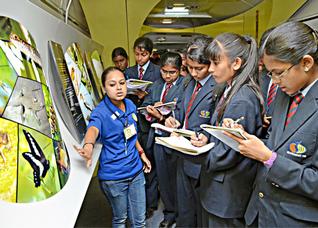Look beyond the textbooks
Students need to deal with real life situations and identify their areas of interest. Modifying the school curriculawould help achieve this.
TELL ME WHY On-field learning inside the Science Express
“Why do we have to study all this?” Those who engage with school students would have been confronted with this question several times. Sometimes, we attempt to logically explain to them the connections between different subjects. Other times, we tell them to just do the work and stop wrecking their brains about “why this.”
Studying does overwhelm students at times. Many of them are able to stick to the task and keep aside the confusions. Many others just need to figure things out before they can motivate themselves to put their energies into the task.
Not just student motivation, connections to real life experiences and aspirations also are important for internalising what one learns at school. In the absence of concrete experiences to relate with, the knowledge keeps slipping. Moreover, the learning is possibly not available when students are faced with real-life situations.
When students take various aptitude tests in the high school, they do not get clear answers. This happens because the results of aptitude tests need to be linked to interest areas and life aspirations. It is quite common for students to feel confused about subject choices and career goals. The irony is that the more skilled the student, the steeper would be the confusions because the aptitude test result would indicate hundreds of options for the student.
If students have not clearly established the kind of tasks that attract their attention or give them joy, it would be very difficult for them and their families to take a prudent decision. Students going through undergraduate, and, sometimes, even graduate schools, without really knowing what they enjoy doing, is a dangerous situation.
Experiential learning
So what can be done to establish these connections early on? The school curricula should be programmed around experiential learning. In other words, students should be learning by doing and not by just reading the information.
The school programmes should facilitate problem-solving skills from early school years. School situations have quite a variety and closely resemble real-life situations of difficulty, confusion and conflict. When teachers and families help students come up with different solutions instead of telling them what to do, students learn to think about diverse possibilities.
Self-awareness of each student should be raised. Knowing one’s strengths and weaknesses is a powerful tool for our interaction with the world. Each experience teaches us something about ourselves.
With younger students, parents and teachers need to help them draw from what they learn and become conscious about it.
Putting students in different skilled roles can also help. Within a school system, there is ample opportunity for each student to be assigned a different task.
School personnel should attempt to help students build life and occupational skills from the early school years. Many a time, tasks are simple but tell us a lot about the developing (or needing development) skills of the students.
Another method is pairing students with professionals in the community. By the time students enter Class IX, they should have some interest areas that they feel inclined towards.
Drawing inspiration from professionals who can be good role-models would go a long way. When students experience the real world, they are likely to feel enthused and have a sense of direction.
Assigning mentors is important as well. Growing up years can overwhelm students. It is helpful to have someone who stays in touch with students, has the ability to guide, lends a listening ear and helps in decision-making. Research suggests that having one significant adult relationship outside the family is correlated with better outcomes for school students.
The writer is Founder Director, EdEssential, and a Nationally Certified School Psychologist.
In the absence of concrete experiences to relate with, knowledge keeps slipping.







